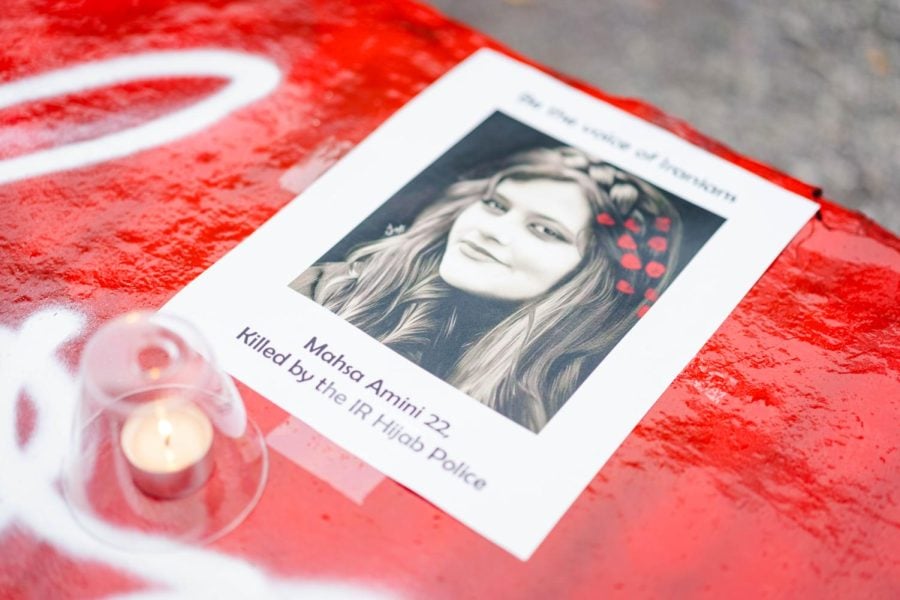Global health studies prof discusses significance of Iran protests, future of the movement
Jonah Elkowitz/Daily Senior Staffer
A photo of Masha Amini at a vigil last month at The Rock. Hoominfar described the protests since her death as a revolution.
November 2, 2022
Global health studies Prof. Elham Hoominfar discussed the recent protests in Iran in a Wednesday lecture hosted by Northwestern’s Buffett Institute for Global Affairs.
Since the death of Mahsa Amini, protests have erupted across Iran and the world. Amini, a 22-year-old Kurdish woman, reportedly died at the hands of Iran’s morality police, a government entity tasked with enforcing the Islamic dress code, after allegedly not wearing her hijab correctly. Her death has compelled many Iranians, primarily women, to demand governmental changes.
Hoominfar said it has been unsettling to watch the events unfold while thousands of miles away from Iran.
“All of us Iranians are not feeling good these days,” she said. “But your attention and solidarity is very valuable for us.”
In the moderated event, Hoominfar also discussed her frustration with the media branding the protests as the first time women are leading a movement in Iran. Women have been organizing in Iran long before today and against this regime since it took power in 1979, she said.
For years, Iran has perpetuated what Hoominfar described as “gender apartheid” by arguing that gender equality is a Western concept that shouldn’t be imposed on Iranian people. Hoominfar said the current wave of protests pushes back against this narrative.
She said “women, life, freedom,” a popular slogan of the protests, is indicative of this shift.
“The amazing slogan in that protest was freedom is universal, neither Eastern nor Western,” Hoominfar said.
Hoominfar said the Iranian government has marginalized women by requiring them to attend separate schools, wear hijabs and obtain their husband’s permission to leave the country.
The country’s high female literacy rates compared to its low labor force participation rates is evidence of the purposeful limiting of women’s roles nationwide, Hoominfar said.
“This gap is showing how much (the) Islamic state tries to turn women to their house,” she said.
In response to an audience question about whether Iran was ready for a secular government, Hoominfar was emphatic that the country was prepared.
She said the current protesters are explicitly excluding Islamic language from their messaging, a sign of a shift toward secularism, and that Iranians have seen what 43 years of religious governance has delivered.
Hoominfar said she had mixed opinions on sanctions due to the harm they sometimes impose on ordinary Iranians. She instead called for targeted sanctions against Iranian government officials and their inner familial and governmental circles.
She also said international grassroots movements should try to connect with people fighting in Iran and push their respective governments to put pressure on the country’s leadership.
In an October statement, President Joe Biden said the U.S. was taking action to hold Iran accountable. The administration was also working to ensure Iranians had internet access after Iran limited access in retaliation to the demonstrations, according to the statement.
“We will continue holding Iranian officials accountable and supporting the rights of Iranians to protest freely,” Biden said.
Buffett Institute Executive Director Annelise Riles, the event’s moderator, told The Daily she appreciated Hoominfar’s interdisciplinary perspective on the matter, given her wide-ranging research on social movements and Iran.
“You’ve given us context that goes far beyond what the headlines in the news share,” Riles said to Hoominfar during the event.
Hoominfar said the Mahsa Amini-inspired movement is already a “revolution.” Though she said it’s scary knowing the government will crack down on it, seeing the possibility of change on the horizon is exciting.
Most importantly, Hoominfar said, she’s proud that so many women —- whom the government would deem as disorderly — are taking action.
“I’m so glad we can see today lots of bad girls in the streets,” she said.
Email: [email protected]
Twitter: @GiangiulioDavis
Related Stories:
—Community members mourn deceased Kurdish woman, voice support for nationwide protests in Iran
—Northwestern student from Iran barred from entering country after visa cancelled


